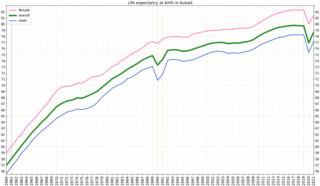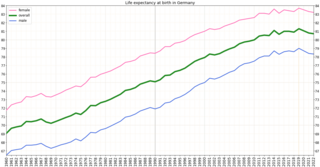Related Research Articles

Saudi Arabia, officially the Kingdom of Saudi Arabia (KSA), is a country in West Asia and the Middle East. It covers the bulk of the Arabian Peninsula and has a land area of about 2150000 km2, making it the fifth-largest country in Asia and the largest in the Middle East. It is bordered by the Red Sea to the west; Jordan, Iraq, and Kuwait to the north; the Persian Gulf, Qatar and the United Arab Emirates to the east; Oman to the southeast; and Yemen to the south. Bahrain is an island country off its east coast. The Gulf of Aqaba in the northwest separates Saudi Arabia from Egypt and Israel. Saudi Arabia is the only country with a coastline along both the Red Sea and the Persian Gulf, and most of its terrain consists of arid desert, lowland, steppe, and mountains. The capital and largest city is Riyadh; the kingdom also hosts Islam's two holiest cities of Mecca and Medina.

Health care in Saudi Arabia is a national health care system in which the government provides free universal healthcare coverage through a number of government agencies. There is also a growing role and increased participation from the private sector in the provision of health care services. Saudi Arabia has been ranked among the 26 best countries in providing high quality healthcare.

Health in Saudi Arabia refers to the overall health of the population of Saudi Arabia. Government prioritization of preventive healthcare and environmental health began in 1925 following the establishment of a public health department. The decision to create it came after a royal decree from King Abdul Aziz Al-Saud. The government announced plans to increase taxes on soft drinks and tobacco in December 2015.

The British United Provident Association Limited, trading as Bupa, is a British multinational health insurance and healthcare company with over 43 million customers worldwide.

Obesity in the United Kingdom is a significant contemporary health concern, with authorities stating that it is one of the leading preventable causes of death. In February 2016, former Health Secretary Jeremy Hunt described rising rates of childhood obesity as a "national emergency". The National Childhood Measurement Programme, which measures obesity prevalence among school-age pupils in reception class and year 6, found obesity levels rocketed in both years groups by more than 4 percentage points between 2019–20 and 2020–21, the highest rise since the programme began. Among reception-aged children, those aged four and five, the rates of obesity rose from 9.9% in 2019–20 to 14.4% in 2020–21. By the time they are aged 10 or 11, more than a quarter are obese. In just 12 months, the rate is up from 21% in 2019–20 to 25.5% in 2020–21.

Cardiovascular disease is the principal cause of death in the UAE, constituting 28 percent of total deaths; other major causes are accidents and injuries, malignancies, and congenital anomalies.

In Kuwait, life expectancy at birth in 2013 was 78 for men and 79 for women.
Obesity in Chile is a growing health concern with health officials stating that it is one of the leading causes of preventable deaths in the Chile. According to Forbes, Chile ranks 23 on a 2007 list of fattest countries with a percentage of 65.3% of its citizens with an unhealthy weight. Until the late 1980s, malnourishment was the major concern and many poor Chileans were underweight. However economic development has brought an obesity crisis, which the government is taking measures to solve.

Obesity is a major issue for the Republic of Nauru. The World Health Organization (WHO) has estimated that 94.5% of Nauruans are overweight or obese, with an obesity rate of 71.7%.

Obesity in Greece is a growing health concern with health officials stating that it is one of the leading causes of preventable deaths in Greece.
Obesity in Austria has been increasingly cited as a major health issue in recent years. Forty per cent of Austrians between 18 and 65 are considered overweight while eleven per cent of those overweight meet the definition of obesity. Forbes.com ranks Austria as the 52nd fattest country in the World with a rate of 57.1%. Approximately 900,000 people are considered obese.

Obesity in Sweden has been increasingly cited as a major health issue in recent years. Sweden is the 90th fattest country in the world. In 2009, the number of people who are considered overweight or obese had not increased for the first time in 70 years. Claude Marcus, a leading Swedish nutrition expert from the Karolinska Institutet, stated that one solution is to introduce a fat tax. Folksam refused to insure a 5-year-old girl from Orust. The insurance company refused her insurance based on "serious overweight/obesity". A report showed that children whose parents were better educated had a lower chance of becoming overweight.

Life expectancy in France at birth was 81 years in 2008. A new measure of expected human capital calculated for 195 countries from 1990 to 2016 and defined for each birth cohort as the expected years lived from age 20 to 64 years and adjusted for educational attainment, learning or education quality, and functional health status was published by the Lancet in September 2018. France had the ninth highest level of expected human capital with 25 health, education, and learning-adjusted expected years lived between age 20 and 64 years.

New Zealand is a high income country, and this is reflected in the overall good health status of the population. However like other wealthy countries, New Zealand suffers from high rates of obesity and heart disease.

Health in Qatar has undergone significant improvement in the last several decades as a result of substantial investments in healthcare by the government. Child mortalities have been reduced by over fifty percent since the 1990s. Qatar's healthcare spending is among the highest in the Middle East, with $4.7 billion being invested in healthcare in 2014. The country's progress in health is hampered by exceedingly high rates of obesity, diabetes and genetic disorders.

Germany ranked 20th in the world in life expectancy in 2014 with 76.5 years for men and 82.1 years for women. It had a very low infant mortality rate, and it was eighth place in the number of practicing physicians, at 3.3 per 1,000 people.

The Ministry of Health, commonly abbreviated to MoH, is the ministry overseeing the health care and health policy of Saudi Arabia. The ministry is tasked with formulating strategies to ensure public health in the country, while also managing crucial health infrastructure.

Youth in Saudi Arabia are the citizens of the Kingdom of Saudi Arabia who are between the ages of 15 and 24. In 2015, the estimated population was around twenty-seven million, and 19.11% of the population was between the ages of 15 and 24.
Yasmin Ahmed Almubarak Altwaijri is a Senior Scientist and the Head of Epidemiology Research at King Faisal Specialist Hospital and Research Centre (KFSH&RC) in Riyadh, Saudi Arabia. As the Head of Epidemiology Research, she studies the causes and effects of diseases and illnesses within a specific country, in her case Saudi Arabia. She studies the prevalence of conditions such as obesity and mental illness in Saudi society, and is active in advocating for social and political changes to promote better health.
References
- ↑ Althumiri, Nora A.; Basyouni, Mada H.; Almousa, Norah; Aljuwaysim, Mohammed F.; Almubark, Rasha A.; Bindhim, Nasser F.; Alkhamaali, Zaied; Alqahtani, Saleh A. (2021). "Obesity in Saudi Arabia in 2020: Prevalence, Distribution, and Its Current Association with Various Health Conditions". Healthcare. 9 (3): 311. doi: 10.3390/healthcare9030311 . PMC 7999834 . PMID 33799725. S2CID 232385007.
- ↑ Lauren Streib (February 8, 2007). "World's Fattest Countries". Forbes. Archived from the original on October 16, 2007. Retrieved 2016-07-15.
- ↑ Khan, Fouzia (17 February 2014). "70% of Saudis are obese, says study". Arab News. Retrieved 27 October 2014.
